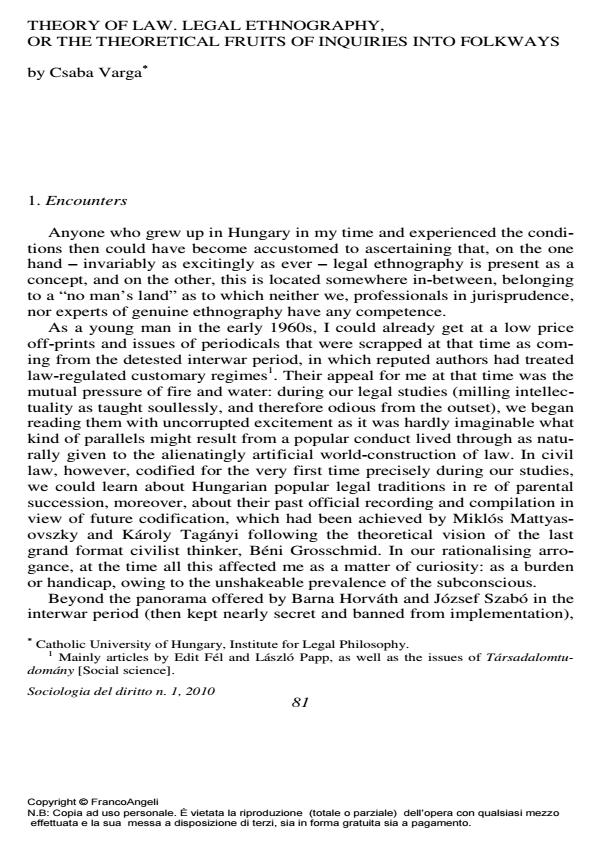Theory of law. Legal ethnography, or the theoretical fruits of inquiries into folkways
Journal title SOCIOLOGIA DEL DIRITTO
Author/s Csaba Varga
Publishing Year 2010 Issue 2010/1
Language English Pages 21 P. 81-101 File size 358 KB
DOI 10.3280/SD2010-001004
DOI is like a bar code for intellectual property: to have more infomation
click here
Below, you can see the article first page
If you want to buy this article in PDF format, you can do it, following the instructions to buy download credits

FrancoAngeli is member of Publishers International Linking Association, Inc (PILA), a not-for-profit association which run the CrossRef service enabling links to and from online scholarly content.
Encounters - Disciplines -The lawyerly interest - Law and/or laws - Conclusion. Rechtliche Volkskunde is distinguished from legal anthropology, and the latter from both legal ethnology and legal pluralism, as well as from research on aboriginal law, claiming the first three to be law-related parts of non-legal disciplines, in contrast to Ethnologischer Jurisprudenz and anthropology of law, taken as directions within the field of jurisprudence. For the time being, none of the first has erected its own theories, nor has socio-ethnography interfered with legal theorising. Since Ehrlich and Weber realised that laws may prevail independently of the states’ "Westphalian duo", a number of attempts at both extending and narrowing the law’s usual remit has been tested. Considering the pendulum movement between monism and pluralism in a historical perspective, renaming what is at stake by altering the terminology is not and should not be a primary issue. As formulated by the author a quarter of a century ago, "Law is (1) a global phenomenon embracing society as a whole, (2) able to settle conflicts of inter- ests that emerge in social practice as fundamental, while (3) prevailing as the supreme controlling factor in society".
- General Reports of the XXth General Congress of the International Academy of Comparative Law - Rapports généraux du XXème Congrès général de l'Académie internationale de droit comparé Csaba Varga, pp.1 (ISBN:978-3-030-48674-7)
- Comparative Law and Multicultural Legal Classes: Challenge or Opportunity? Csaba Varga, pp.3 (ISBN:978-3-030-46897-2)
- Law in the New Democracy Paula Jane Byrne, (ISBN:9781760467135)
- Hungarian Legal Ethnography from the Perspective of Theoretical Legal Thought Csaba Varga, in Acta Ethnographica Hungarica /2022
DOI: 10.1556/022.2022.00003
Csaba Varga, Theory of law. Legal ethnography, or the theoretical fruits of inquiries into folkways in "SOCIOLOGIA DEL DIRITTO " 1/2010, pp 81-101, DOI: 10.3280/SD2010-001004